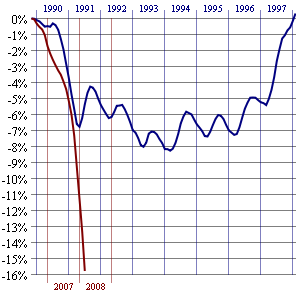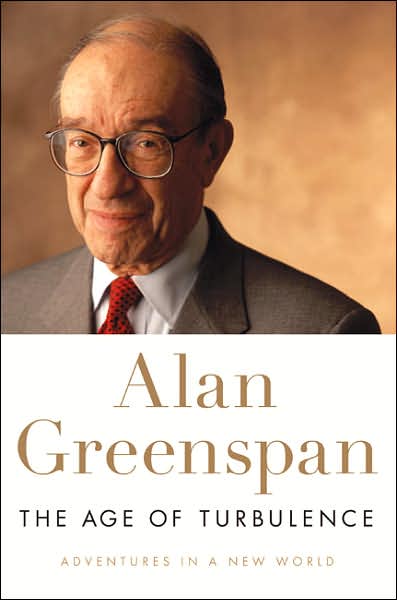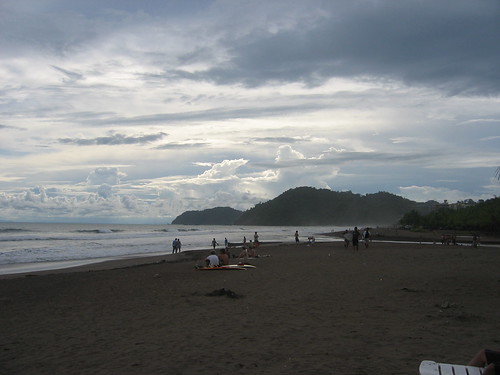Posts from — July 2008
Why I Didn’t Buy a House
When I started working a few years back, it didn’t take too long for friends, family, and co-workers to start pressuring me about buying a house (or condo). The most common remark was this: “By renting, you’re just throwing your money down the drain.” I had also read the book Rich Dad, Poor Dad by Robert Kiyosaki (before Kiyosaki turned into that creepy informercial guy peddling his wares on late-night TV. But, that really is a great book.) I did a little bit of due diligence, and it didn’t take me long to figure out that to buy even a tiny condo in the Boston area, I would have had to take out a huge mortgage. Here’s a quick example. A $300,000 mortage at 6% interest would make my monthly payments about $1800/month. As I’d get further into the mortgage, my payments toward principal would increase and payments toward interest would go down. My first payment would be $300 towards principal and $1500 toward interest! Even after 5 years into the mortgage, I would still be paying only $400 into principal, and $1400 into interest. How’s that for throwing money down the drain?

Comparison of the percentage change of the Case-Shiller Home Price Index for the housing correction beginning in 2005 (red) and the 1980s–1990s correction (blue), comparing monthly CSI values to the peak value seen just prior to the first declining month all the way through the downturn and the full recovery of home prices. Source: Wikipedia
Yeah you can deduct your interest payments from your taxes, so you recoup about a third of those interest payments. So the money I would pay towards interest in a mortgage wouldn’t be too far off from the $1000 in monthly rent that I pay. But as Robert Kiyosaki would say, buying a house or condo comes with a lot of non-obvious expenses – property taxes, maintenance, insurance – stuff you don’t have to worry about with an apartment.
Certainly, there are a lot of issues I have glossed over here. First of all it depends on where you live. If I could buy a nice place for $100k it would certainly be an easier decision. Also, it’s different if you’re buying investment property, or for example, a three-family house where you’ll live in one of the units, etc. Plus you just have to have the financial discipline to take the money you would have put into your mortgage payments and put that into an alternative investment. I’d suggest your 401k because up to $15,500 per year is tax-deductible, just like the mortgage interest payments. But in any case you should do your due diligence. I used Excel to make a detailed spreadsheet for my case but this website from the NY Times can help you with the math:
Now I’m not going to say that I predicted the severity of the housing bust, but in my humble opinion I did think prices were outrageous. And I’m certainly glad that I did my homework and decided not to buy a few years back. The same people that were pressuring me to buy then are now telling me how great of a time it is to buy. Maybe so, but I think those times will be here for a while, and my previous argument still holds. So the next time someone tells you that you’re throwing your money down the drain by renting, tell them to think again.
July 31, 2008 2 Comments
Unhappy Valley
Penn State is widely regarded as a top-tier public university, but it is probably most famous for its Division I football program. The program’s current coach, Joe Paterno, has held the job since 1966. In the 42 seasons under his leadership, Penn State football has finished in the AP Top 25 a remarkable 30 times, including 5 undefeated seasons and national championships in 1982 and 1986. At the same time, the program has been respected for maintaining high academic standards.
However, in recent years the team has struggled, enduring 4 losing seasons since 2000. Coach Paterno, now 81, has been under considerable pressure to retire and hand over the reigns to a capable successor. Despite the team’s recent struggles, there was never much attention paid to off-the-field issues, until now. A new investigative report from ESPN’s Outside the Lines series has shed light on the increasing rate of criminal charges filed against Penn State football players over the past 8 years. In the report, OTL insinuates that Paterno decided to recruit talented players with known character issues in the hopes of returning the program to past glory. Additionally, OTL says that Paterno and the University used the influence of the football program to secure favored treatment for athletes. Paterno denies the allegations and I have to side with him. He’s been a character guy for his entire career, and I can’t believe he would risk his reputation for a few more wins now. Also, the story is clearly one-sided – there is little comparison of Penn State to other football programs or a comparison to past years when the program was winning. But the report is still cause for concern. You be the judge.
July 29, 2008 No Comments
A Future of Turbulence
So here’s my first somewhat serious blog post. I’ve just finished a great book called The Age of Turbulence, written by former Federal Reserve Chairman Alan Greenspan. The first half of the book is essentially a chronological story of his life and career, including his stint as Federal Reserve Chairman from 1987 to 2006. All told he worked for seven presidents in some economic leadership role, and the insight and stories he shares from working in those administrations is absolutely fascinating. The second half of the book is more devoted to his views on economic policy and the challenges that the United States faces as a result of globalization, rising energy and health care costs, and the continued threat of terrorism.
I certainly share Alan Greenspan’s libertarian economic views and his belief that the country needs to maintain as much of a free-market society as possible if we want to look forward to continued economic prosperity. I was definitely reading this book with an eye on the upcoming presidential election. It seems that if we want to put and end to our economic woes we will need to elect the candidate who will do the following:
- Embrace globalization. If we elect a candidate who favors trade barriers or government assistance to protect and U.S. manufacturing jobs lost in the short-term, we will become less competitive in a global market in the long-term, and our economic standing in the world will fade.
- Exercise fiscal restraint. The U.S. federal budget in 2008 was $2.9 trillion. Of this, the mandatory budget items in order were Social Security ($608 billion – 21%), Medicare ($386 billion – 13%), Unemployment/Welfare ($324 billion – 11%), Interest on the National Debt ($261 billion – 9%), and Medicaid + SCHIP ($209 billion – 7%). As for discretionary spending, the Department of Defense leads ($481 billion – 12%). Included partly in this number are the wars in Iraq and Afghanistan ($190 billion – 7%). The entitlement programs account for 52% of government spending and are set to increase as more baby boomers hit retirement age. Comparatively, the wars in Iraq and Afghanistan are relatively cheap. Additionally, interest payments on our debt are up to 9%. Hopefully our next president will reign in federal spending and at least try to balance the budget.
- Lay the groundwork for energy sustainability and independence. I think everyone knows that we need to find new sources of energy that are cheap, abundant/renewable, clean, and produced at home so that the cost of energy doesn’t hamper economic growth, so we don’t destroy the planet, and so we can be less involved in the affairs of the ever-unstable Middle East.
- Reduce income disparities. Note that this is NOT equivalent to income redistribution. Greenspan says that there are two reasons why there is a growing wage gap in the U.S. which leads to social unrest and politicians touting populist economic policies. One reason is that skilled workers are overpaid on the high end because there is a shortage of them. We can reduce the shortage by loosening up immigration restrictions to make it easier for engineers, scientists, and doctors to come to work in the U.S. A larger supply of skilled workers will reduce the salaries commanded by those workers (perhaps much to my chagrin!) Additionally we can improve our education system so that we produce more skilled workers. A by-product of an improved education system is economic mobility on the low-end. If we can get more people educated and into high-skilled jobs, then there will be less people working in low-skilled jobs. Consequently, the people left in low-skilled jobs will probably be paid more because of the low supply of those workers.
Not surprisingly, neither Barack Obama or John McCain has released a substantial amount of detail about his economic policy. We’ll have to keep an eye out for more of that information.
July 27, 2008 5 Comments
Pura Vida Costa Rica!
Costa Ricans have a saying, “Pura Vida!” which literally means “pure life,” but contextually means something like “full of life.” I think this refers mostly to the touristy things you can do in Costa Rica – relax on beautiful beaches, swim in natural hot springs, explore the rain forest and volcanos, and do some miscellaneous adventure-seeking. Indeed the slogan “Pura Vida!” is also used by the country’s most popular local beer company, Imperial.
I did do a lot of the conventional tourist activities, but since I stayed for a week with a friend and his family who are native Costa Ricans, I got a sense of what it is really like to live in the country. Here are a few notes that I made to myself during the trip:
- Costa Rica is largely the envy of the other Central American countries. They’ve had the longest run of democracy compared to those other countries, so the government and economy is relatively quite stable. They’ve taken great care of their natural environment, so tourism (and especially ecotourism), is booming and their economy has been a major benefactor. One resident told me that Costa Rica is to lower Central America what the United States is to Mexico.
- Since Costa Rica is a small country with a fairly homogeneous population in a historically turbulent area, the residents are a tight-knit group. If you’re a native Costa Rican, it seems that you can talk to a complete stranger like you’ve known him/her for years.
- Globalization is evident and high-tech is already there. IBM, HP, and Intel take advantage of some corporate tax-free zones near the capital city, San José.
- I expected the weather to be quite humid, but it wasn’t at all. I did visit during the rainy season, but during the day it was warm and dry, usually with a nice breeze blowing. It would usually rain in the late afternoon, and then cool down nicely at night.
- Surprisingly (or not), very few people outside of the major tourist areas speak English. If I wasn’t with a friend who spoke fluent Spanish, I would have had a lot of trouble getting around and finding things.
Overall, I had a lot of fun on the trip and it was a great experience to see a different part of the world that I hadn’t seen before. I’d definitely recommend visiting Costa Rica to anyone, whether you’re going to be a conventional tourist or not.
July 21, 2008 1 Comment
Tree Hopping
I’m planning on taking some time off and going to beautiful Costa Rica for a vacation. One thing I plan to do while I’m there is take a canopy tour:
I’m a bit scared of heights, so we’ll see how it goes! Also I’d like to try out surfing while I’m there. Check back later for a summary of my trip and some pics.
July 10, 2008 No Comments

